unit4 grammar 虚拟语气
人教版 初中英语九年级教案 之 unit4 + 虚拟语气
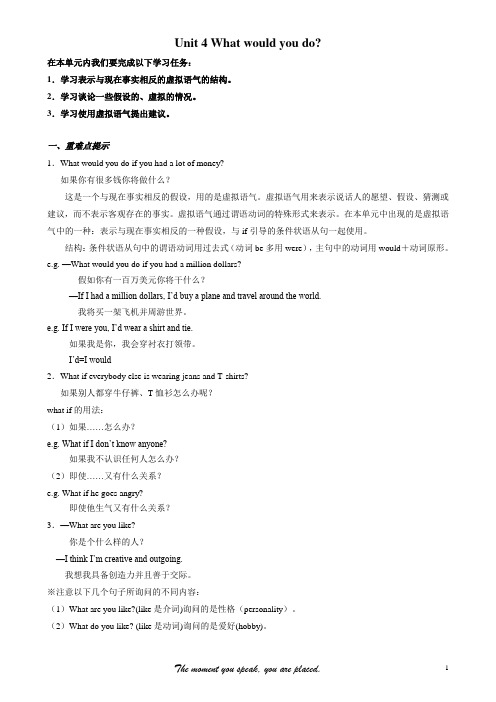
Unit 4 What would you do?在本单元内我们要完成以下学习任务:1.学习表示与现在事实相反的虚拟语气的结构。
2.学习谈论一些假设的、虚拟的情况。
3.学习使用虚拟语气提出建议。
一、重难点提示1.What would you do if you had a lot of money?如果你有很多钱你将做什么?这是一个与现在事实相反的假设,用的是虚拟语气。
虚拟语气用来表示说话人的愿望、假设、猜测或建议,而不表示客观存在的事实。
虚拟语气通过谓语动词的特殊形式来表示。
在本单元中出现的是虚拟语气中的一种:表示与现在事实相反的一种假设,与if引导的条件状语从句一起使用。
结构:条件状语从句中的谓语动词用过去式(动词be多用were),主句中的动词用would+动词原形。
e.g. —What would you do if you had a million dollars?假如你有一百万美元你将干什么?—If I had a million dollars, I’d buy a plane and travel around the world.我将买一架飞机并周游世界。
e.g. If I were you, I’d wear a shirt and tie.如果我是你,我会穿衬衣打领带。
I’d=I would2.What if everybody else is wearing jeans and T-shirts?如果别人都穿牛仔裤、T恤衫怎么办呢?what if的用法:(1)如果……怎么办?e.g. What if I don’t know anyone?如果我不认识任何人怎么办?(2)即使……又有什么关系?e.g. What if he goes angry?即使他生气又有什么关系?3.—What are you like?你是个什么样的人?—I think I’m creative and outgoing.我想我具备创造力并且善于交际。
Unit4 语法学案虚拟语气
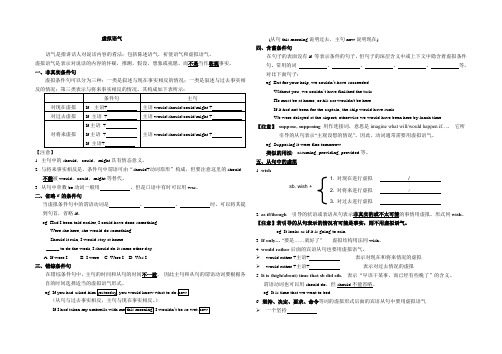
虚拟语气语气是指讲话人对说话内容的看法:包括陈述语气,祈使语气和虚拟语气。
虚拟语气是表示对说话的内容的怀疑,推测,假设,想象或祝愿,而不是当作客观事实。
一、非真实条件句虚拟条件句可以分为三种:一类是叙述与现在事实相反的情况;一类是叙述与过去事实相【注意】1. 主句中的should ,could ,might 具有情态意义。
2. 与将来事实相反是,条件句中谓语可由“should+动词原形”构成,但要注意这里的should不能被would ,could ,might 等替代。
3. 从句中单数be 动词一般用 ,但是口语中有时可以用was 。
二、省略if 的条件句当虚拟条件句中的谓语动词是 、 、 时,可以将其提到句首,省略if 。
eg. Had I been told earlier, I could have done something. Were she here, she would do something. Should it rain, I would stay at home._____ to do the work, I should do it some other day. A. If were I B. I were C. Were I D. Was I 三、错综条件句在错综条件句中,主句的时间和从句的时间不一致, 因此主句和从句的谓语动词要根据各自的时间选择适当的虚拟语气形式。
(从句与过去事实相反,主句与现在事实相反。
)’(从句this morning 说明过去,主句now 说明现在) 四、含蓄条件句在句子的表面没有if 等表示条件的句子,但句子的深层含义中或上下文中隐含着虚拟条件句。
常用的词 、 、 、 、 等。
对比下面句子:eg. But for your help, we couldn ’t have succeeded. Without you, we couldn ’t have finished the task. He must be at home, or his car wouldn't be here.If it had not been for the captain, the ship would have sunk.We were delayed at the airport; otherwise we would have been here by lunch time.【注意】 suppose, supposing 用作连接词,意思是imagine what will/would happen if…。
unit4 grammar 虚拟语气 use
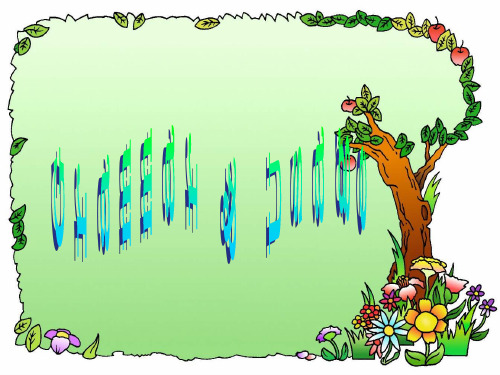
3.In adverbial clauses introduced by even if, as if, as though and if only we can use unreal conditionals.
他那样对待我,好像我是陌生人似的。 He treated me as if I were a stranger.
It’s high time that you went. 你该走了。 It’s high time that you should go. 我们该去 It’s time that we went to bed.
睡觉了。
It’s time that we should go to bed.
4.表示要求,命令,建议的虚拟语气。 1.宾语从句。常见动词: 一个坚持,两个命 令,三个建议,四个要求。即 1.insist 2. order, command
我希望和你一样高。
I wish I were as tall as you.
他希望他没讲那样的话。
He wished he hadn‘t said that.
我希望明天下雨就好了。
I wish it would rain tomorrow.
现在: did
2. would rather that
过去: had done 未来: did
ቤተ መጻሕፍቲ ባይዱ
I suggest that we (should) hold a meeting next week. He insisted that he (should ) be sent there. 注意: 如suggest, insist不表示"建议" 或"坚 持要某人做某事时",即它们用于其本意" 暗示、表明"、"坚持认为"时,宾语从句用 陈述语气。
人教版初中英语九年级教案之unit4虚拟语气
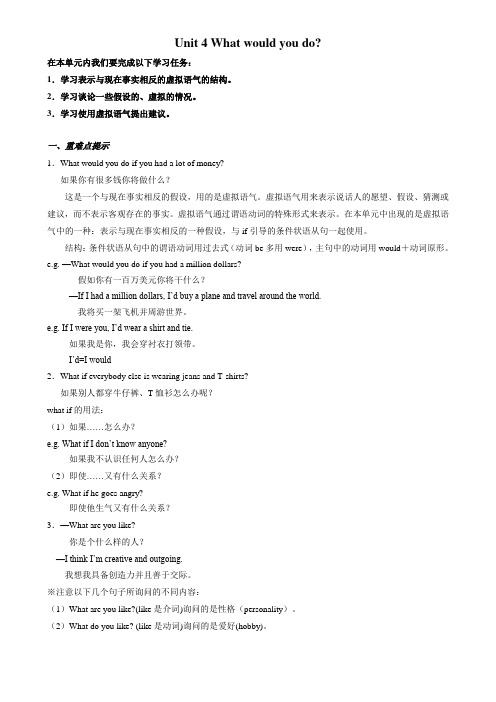
Unit 4 What would you do?在本单元内我们要完成以下学习任务:1.学习表示与现在事实相反的虚拟语气的结构。
2.学习谈论一些假设的、虚拟的情况。
3.学习使用虚拟语气提出建议。
一、重难点提示1.What would you do if you had a lot of money?如果你有很多钱你将做什么?这是一个与现在事实相反的假设,用的是虚拟语气。
虚拟语气用来表示说话人的愿望、假设、猜测或建议,而不表示客观存在的事实。
虚拟语气通过谓语动词的特殊形式来表示。
在本单元中出现的是虚拟语气中的一种:表示与现在事实相反的一种假设,与if引导的条件状语从句一起使用。
结构:条件状语从句中的谓语动词用过去式(动词be多用were),主句中的动词用would+动词原形。
e.g. —What would you do if you had a million dollars?假如你有一百万美元你将干什么?—If I had a million dollars, I’d buy a plane and travel around the world.我将买一架飞机并周游世界。
e.g. If I were you, I’d wear a shirt and tie.如果我是你,我会穿衬衣打领带。
I’d=I would2.What if everybody else is wearing jeans and T-shirts?如果别人都穿牛仔裤、T恤衫怎么办呢?what if的用法:(1)如果……怎么办?e.g. What if I don’t know anyone?如果我不认识任何人怎么办?(2)即使……又有什么关系?e.g. What if he goes angry?即使他生气又有什么关系?3.—What are you like?你是个什么样的人?—I think I’m creative and outgoing.我想我具备创造力并且善于交际。
M6U4grammar虚拟语气 文化+英语 赞的哟
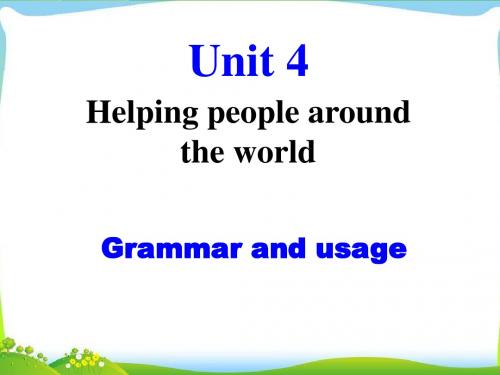
I would rather you went home now. Don't come tomorrow, I'd rather you came next week. I'd rather you hadn't done that before. would rather后从句中的虚拟语气有什么特殊之处 ?
would have arrived But for the storm, we __________________(arrive) earlier.
宾语从句中的虚拟语气
were I wish everyday ________(be) Sunday. We have so much in common! I wish I had __________ known (know) you earlier!
命令:order, instruct … 建议:advise, suggest, recommend
要求:demand , require, urge, insist(坚决要求)
The teacher demands that every student (should) ____________ finish (finish) homework by himself/herself.
would be I wish we __________(be) schoolmates at university.
类似地
were If only I _________(be) a super hero now.
had followed If only I _______________(follow) your advice yesterday. could have If only we ___________(have) one day off tomorrow.
高中英语Unit4SectionⅢGrammar__虚拟语气Ⅱ教案含解析牛津译林版选修6
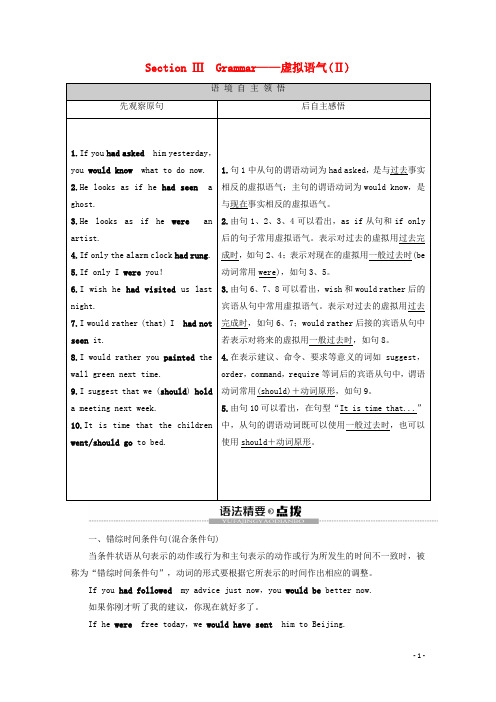
Section ⅢGrammar——虚拟语气(Ⅱ)一、错综时间条件句(混合条件句)当条件状语从句表示的动作或行为和主句表示的动作或行为所发生的时间不一致时,被称为“错综时间条件句”,动词的形式要根据它所表示的时间作出相应的调整。
If you had followed my advice just now,you would be better now.如果你刚才听了我的建议,你现在就好多了。
If he were free today,we would have sent him to Beijing.如果他今天有空的话,我们就派他去北京了。
[即时训练1] 用所给词的适当形式填空①If you had studied (study)hard before,you would be (be)a college student now.②If you hadn't lost the map,we would be (be)back in the hotel now.二、含蓄虚拟条件句有时虚拟的条件不通过条件从句表达出来,而是暗含在单词、短语或上下文中,这时需要根据句中所表述的意义以及某些特定的信息词来判断此时需要采用的形式。
常用词或短语有:with,without,but for,or else,or,otherwise等。
But for her help,they couldn't have run over the mountain in such a short time.要不是她的帮助,他们不会在那么短的时间内翻过那座山。
I was ill that day.Otherwise,I would have taken part in the sports meeting.我那天病了。
否则,我就参加运动会了。
He must have been there,or he never could know the place so well.他一定去过那儿,否则他决不会如此了解那个地方。
2019-2020英语选修六讲义:Unit 4 Section Ⅲ Grammar——虚拟语气(Ⅱ) 含答案
Section Ⅲ Grammar——虚拟语气(Ⅱ)一、错综时间条件句(混合条件句)当条件状语从句表示的动作或行为和主句表示的动作或行为所发生的时间不一致时,被称为“错综时间条件句”,动词的形式要根据它所表示的时间作出相应的调整。
If you had followed my advice just now,you would be better now.如果你刚才听了我的建议,你现在就好多了。
If he were free today,we would have sent him to Beijing.如果他今天有空的话,我们就派他去北京了。
[即时训练1] 用所给词的适当形式填空①If you had studied (study)hard before,you would be (be)a college student now.②If you hadn't lost the map,we would be (be)back in the hotel now.二、含蓄虚拟条件句有时虚拟的条件不通过条件从句表达出来,而是暗含在单词、短语或上下文中,这时需要根据句中所表述的意义以及某些特定的信息词来判断此时需要采用的形式。
常用词或短语有:with,without,but for,or else,or,otherwise等。
But for her help,they couldn't have run over the mountain in such a short time.要不是她的帮助,他们不会在那么短的时间内翻过那座山。
I was ill that day.Otherwise,I would have taken part in the sports meeting.我那天病了。
否则,我就参加运动会了。
He must have been there,or he never could know the place so well.他一定去过那儿,否则他决不会如此了解那个地方。
高中英语必修四unite4知识点
高中英语必修四unite4知识点高中英语必修四Unit 4主要讲述了语法和词汇两个方面,是英语学习的重点内容。
以下将分别进行介绍。
一、语法知识点1.虚拟语气虚拟语气在英语中是比较重要的一个语法知识点,尤其在口语和写作中经常使用。
它表示的是虚假的或非真实的情况,根据它在句子中的位置不同,可以分为主语从句、宾语从句和条件句。
主语从句:主语从句中,虚拟语气的形式是“should/were + 动词原形”,表示的是我们想象的或未实现的条件,如“如果我有一百万美元,我就会去环游世界。
”宾语从句:宾语从句中的虚拟语气也是“should/were + 动词原形”,但是要注意的是在有些情况下(如宾语从句为动词不定式时)没有虚拟语气。
条件句:条件句中的虚拟语气分为三种情况:第一类条件句表示与现实相反的假设,其形式为“if+过去式+would/could/should+动词原形”,如“If I had enough money, I would buy a house.”;第二类条件句表示与现实相反的假设,其形式为“if+过去完成式+would/could/should+动词原形”,如“If I had met him last week, I could have helped him.”;第三类条件句表示可能发生的情况,其形式为“if+现在式+will/can/should+动词原形”,如“If I have time tomorrow, I will help you.”2.被动语态被动语态在英语中也是一项基本的语法知识点,其句子的主语是被动的,动作的执行者则成为状语,主语可以是各种词类,而被动语态的形成则是将动词的过去分词加上助动词“be”。
被动语态的应用:在写作中被动语态可以强调动作的执行者或结果,可以包含更多的信息,比如说,科技论文中常常应用被动语态来描述实验的程序和结果。
二、词汇知识点1.词根、前缀和后缀词根、前缀和后缀对于学习英语单词是非常有帮助的,在语音、语法和意义的理解方面都有很大的作用。
人教版初中英语九年级教案之unit4虚拟语气
Unit 4 What would you do?在本单元内我们要完成以下学习任务:1.学习表示与现在事实相反的虚拟语气的结构。
2.学习谈论一些假设的、虚拟的情况。
3.学习使用虚拟语气提出建议。
一、重难点提示1.What would you do if you had a lot of money?如果你有很多钱你将做什么?这是一个与现在事实相反的假设,用的是虚拟语气。
虚拟语气用来表示说话人的愿望、假设、猜测或建议,而不表示客观存在的事实。
虚拟语气通过谓语动词的特殊形式来表示。
在本单元中出现的是虚拟语气中的一种:表示与现在事实相反的一种假设,与if引导的条件状语从句一起使用。
结构:条件状语从句中的谓语动词用过去式(动词be多用were),主句中的动词用would+动词原形。
e.g. —What would you do if you had a million dollars?假如你有一百万美元你将干什么?—If I had a million dollars, I’d buy a plane and travel around the world.我将买一架飞机并周游世界。
e.g. If I were you, I’d wear a shirt and tie.如果我是你,我会穿衬衣打领带。
I’d=I would2.What if everybody else is wearing jeans and T-shirts?如果别人都穿牛仔裤、T恤衫怎么办呢?what if的用法:(1)如果……怎么办?e.g. What if I don’t know anyone?如果我不认识任何人怎么办?(2)即使……又有什么关系?e.g. What if he goes angry?即使他生气又有什么关系?3.—What are you like?你是个什么样的人?—I think I’m creative and outgoing.我想我具备创造力并且善于交际。
九年级英语Unit4虚拟语气的用法
九年级英语Unit4虚拟语气的用法虚拟语气是一种动词形式,表示说话人的愿望、假设、猜测、建议等含义,虚拟语气所表示的含义不是客观存在的事实。
下面重点谈谈虚拟语气在条件句中的用法,虚拟语气条件句是用谓语动词的特殊形式来表示与现在、过去事实相反的情况或对将来发生的情况表示怀疑。
具体情况如下:1. 表示与现在事实相反的情况例如:If I were you , I'd get there earlier.如果我是你,我就早一点到那儿。
(事实是:我不是你,因此我没有早到那儿。
)If you went to bed earlier, you would not be so sleepy in the morning. 如果你早点儿睡觉, 早晨就不会这么困了。
(事实是:你经常晚睡, 所以早上觉得困。
)去事实相反的情况例如: If you had worked hard, you wouldn't have failed the exam . 如果你早用功, 你就不至于考试不及格了。
(事实是:你早没用功,所以考试失败了).表示与将来事实相反的情况例如: If it rained tomorrow, our picnic would be put off.如果明天下雨,我们的野餐就推迟。
(事实是:最近天气很好,下雨的可能性不大)If you should be late tomorrow, we would not wait for you.万一你明天迟到了, 我们就不等你了。
(事实是: 迟到是意料之外的事情注意。
)注意:用虚拟语气表示条件的条件从句, 可以放在主句前,也可以放在主句后, 但所表达的意义侧重点不同。
主句在前时,强调“结果”;从句在前时,强调“条件”。
巩固练习:一、单选题( ).1. If I were you ,I try my best.A. wouldB. shallC. hadD. will( ) 2. If I ten years younger, I very happy.A. am ; shall beB. were ; would beC. were ; shall beD. am ; would be( )3.If I to the moon, I would bring something unusual back to the earth.A. goB. goesC. wentD. will go( ) 4. If Jane here now , she would explain to us how to do it.A. beB. isC. wasD. were( ) 5. “You can ask your brother for help.” “He is not at home. If he , I .”A. is ; wouldB. is ; willC. were ; wouldD. were ; will二、用动词的正确形式填空6. If I ( be ) a teacher , I would not be so strict with my students.7. If he ( have ) time, I would come to help you .8. If she were not so busy , she ( come ) here with me .9. He ( go ) to bed if he had finished doing his homework in time .10. If it ( rain ) tomorrow , our picnic would be put off .答案:1.A 2. B 3. C 4. D 5. C 6. were 7. had 8. would come 9. would have gone 10. rained 解析:1—8 都表示与现在事实相反的情况,条件从句的谓语动词用动词的过去式( be 一般用were ),主句的谓语动词用would 或 should + 动词原形。
- 1、下载文档前请自行甄别文档内容的完整性,平台不提供额外的编辑、内容补充、找答案等附加服务。
- 2、"仅部分预览"的文档,不可在线预览部分如存在完整性等问题,可反馈申请退款(可完整预览的文档不适用该条件!)。
- 3、如文档侵犯您的权益,请联系客服反馈,我们会尽快为您处理(人工客服工作时间:9:00-18:30)。
1.We use mixed conditionals when the main clause and the if-clause are about different tenses. Eg. If you had come and attended the meeting yesterday, you would know what we are doing now. If you had followed my advice, you would not be in trouble now.
Without air (If there were not air) , there would be no living things. But for your help (If it hadn’t been for your help) , I couldn’t have done it. I was busy that day. Otherwise I would have gone there with them. (If I hadn’t been busy that day, I would have gone there with them.) I would have finished the work, but I have been ill. (If I hadn’t been ill, I would have finished the work.)
我们建议Tom 去休息一下。 他坚决要求我到场。 国王命令囚犯明天要实施死刑。
他们要求我们派他们去那儿工作。 We suggested that Tom have a rest. He insisted that I (should )be present.
The king ordered that the prisoners be killed the next day. They requested that we (should) send them to work there.
1. Had you listened to the doctor, you _________ all right now. A. are B. were C. would be D. would have been 2. __________ any change about the date, please tell me immediately. A. Will there be B. Should there be C. There will be D. There should be 3. __________ today, he would get there by Friday. A. Would he leave B. Was he leaving C. Were he to leave D. If he leave
If only I knew his name! If only we had followed your advice!
If only I could see him again!
要是我们的父母能和我们住在一起就好了。 要是我没错过火车就好了! If only our parents could live with us! If only I hadn’t missed the train!
I suggest that we (should) hold a meeting next week. He insisted that he (should ) be sent there.
注意: 如suggest, insist不表示"建议" 或"坚
持要某人做某事时",即它们用于其本意" 暗示、表明"、"坚持认为"时,宾语从句用 陈述语气。
注意: 在虚拟语气的从句中,动词'be'的过去时态一律用 "were",不用was, 即在从句中be用were代替。 If I were you, I would go to look for him. 如果我是你,就会去找他。 If he were here, everything would be all right. 如果他在这儿,一切都会好的。
should were to did should (would could, might)
虚拟语气假设条件句型注意点: 1.假设条件从句谓语动词发生的时间与主句 所假设的谓语动词不一致,叫做错综条件 虚拟语气。主句和从句的谓语动词要依照 假设的时间而定。 If the weather had been finer, the crops would be growing still better. If you had followed the teacher’s advice, you wouldn’t be in the hospital.
3.In adverbial clauses introduced by even if, as if, as though and if only we can use unreal conditionals.
他那样对待我,好像我是陌生人似的。 He treated me as if I were a stranger.
= I want to see the manager. I wish the manager to be informed at once. = I want the manager to be informed at once.
现在: did
2. would rather that
过去: had done 未来: did
I wish I were as tall as you. 我希望和你一样高。 He wished he hadn‘t said that. 他希望他没讲那样
的话。
I wish it would rain tomorrow. 我希望明下雨就好
了。 2)wish to do表达法。
wish sb / sth to do I wish to see the manager.
虚拟语气特殊句型: 现在: did(were) 1.wish/if only 过去:had done 未来: would do 1.I wish I were a bird.(现在)
2.I wish I hadn’t made such a mistake.(过去) 3.We wish our parents wouldn’t punish us. (将来)
典型例题 _____ to do the work, I should do it some other day. A. If were IB. I were C. Were I D. Was I
在虚拟条件状语中如果有were, should, had这三个词主语提前, 变成 were, should, had +主语的形式。但要注意,在虚拟条件状语从句 中,省略连词的倒装形式的句首不能用动词的缩略形式。如我们可 说 Were I not to do., 而不能说 Weren't I to do.
I would rather you paid me now. I would rather you had gone, too. Don’t come. I would rather you came tomorrow.
did 3.It’s (about/high) time +that should do It’s high time that you went. It’s high time that you were 你该走了。 going. It’s high time that you should go. 我们该去 It’s time that we went to bed.
Part A Answers A (1) had not studied (2) would not be (4) would have (3) had studied (6) would be (5) knew (8) would not be (7) could help
e otherwise, or and phrases beginning with with, without and but for to replace an ifclause in implied conditionals
4. Should it rain, the crops _____ . A. would be saved B. would have been saved C. will be saved D. had been saved 5. You _____ come earlier. The bus left a moment ago. A.would B. should have C. may D. have 6. What should we do if it _____ tomorrow? A. should snow B. would snow C. snow D. will snow
虚拟语气
1) 概念 虚拟语气用来表示说话人的主观愿望或假 想,所说的是一个条件,不一定是事实,或 与事实相反。 2) 在条件句中的应用 条件句可分为两类,一类为真实条件句, 一类为非真实条件句。非真实条件句表示的 是假设的或实际可能性不大的情况,故采用 虚拟语气。
在条件状语从句中,表示与事实相反的条件和结果。 1) 与现在事实相反: IV原 were 2)与过去事实相反: could, might) V-ed If 主语 ,主语 +have Ved should (would had Ved 3)与将来事实相反: could, might) If 主语 …, 主语 +V原
